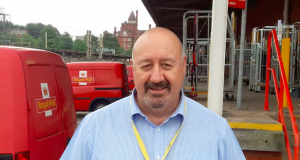We’re delivering change, but management must improve on toolsets and timings
Postal October 14 2021
CWU News caught up with outdoor secretary Mark Baulch after yesterday’s divisional representatives briefing and we asked him for the latest news on revisions and pipeline impacts…
Q: There’s been a massive revisions programme right across the country. What’s the current state of progress on that?
It’s been a challenge certainly. But the good news is that we’ve now deployed over a thousand revisions, with only got around 20 or so of the table-top revisions still outstanding and we’re on track to do that.
On the structural revisions, that’s been more difficult, more of a challenge. We’ve deployed 176 of those revisions so far out of the 400, which was the target by the end of October. It’s fair to say that was a stretching target and it’s proven to be so.
We’re continuing dialogue with Royal Mail nationally in regard to how we deploy the rest of those revisions and, at the moment – with two more weeks of October to go after this week – there are a number scheduled to be deployed.
There will be a situation where it just simply won’t be possible at a certain point to deploy these revisions because we’ll be getting to near to Christmas and we’re continuing dialogue with the company in that regard. But we’re determined to deliver the benefits and the agreement which we signed up to with Royal Mail in terms of introducing the shorter working week by the end of October in all units.
It’s been a challenge that’s been made more difficult because of Covid, and more difficult because of some of the tools in the systems.
We have to find a better way going forward, and we’re going to jointly review and re-evaluate the current process, the current toolset that’s been used in those revisions and learn the lessons.
We can’t afford to make the same mistakes going into next year’s deployment of revisions.
So that has to happen and we will do that.
In some of those units where we have deployed revisions, several of those that I’ve visited, there are still some issues outstanding, particularly around frame layouts not being done correctly and in walk sequencing – the way that work is arriving not correlating to the actual route. There are also some issues in loop planning. and some of the imbalances on delivery.
We will work through those and we’re pushing the company very hard that they go back to those units where we’ve still got issues and we’re chasing and pushing and putting as much pressure on the company nationally as we can do, in order to make those corrections and put good some of those issues.
It’s been an extremely busy year, particularly over the last few months as it intensifies as we get nearer to the end of October deadline.
I understand that people are under a lot of pressure. I want to thank everyone, and the reps in particular, for the hard work they’ve put in.
We are learning lessons from the deployment. It has to be improved.
And we will do that.
Q: In the pipeline discussions today, in terms of the new hub, what were the key points from a delivery perspective?
We needed to update the divisional reps following last week’s postal executive, and some ‘red-line’ issues which we currently have with the company. Those red lines concern the company’s position around delaying workload until the afternoon – larger format three and four items – this is driven through the sortation capability in the new hub and that is a major red line for us.
We don’t believe that products should be delayed and we think that they should be delivered from all delivery offices, or at least from all those that have the capability and capacity to deliver parcels from the a.m. period and not delayed artificially into the afternoon.
We think that’s the wrong way to go.
It restricts the operation in terms of innovation. It restricts the ability for new growth of products and services and expansion in other areas. It’s not an acceptable position for us and we’ve articulated that to the divisional representatives today.

